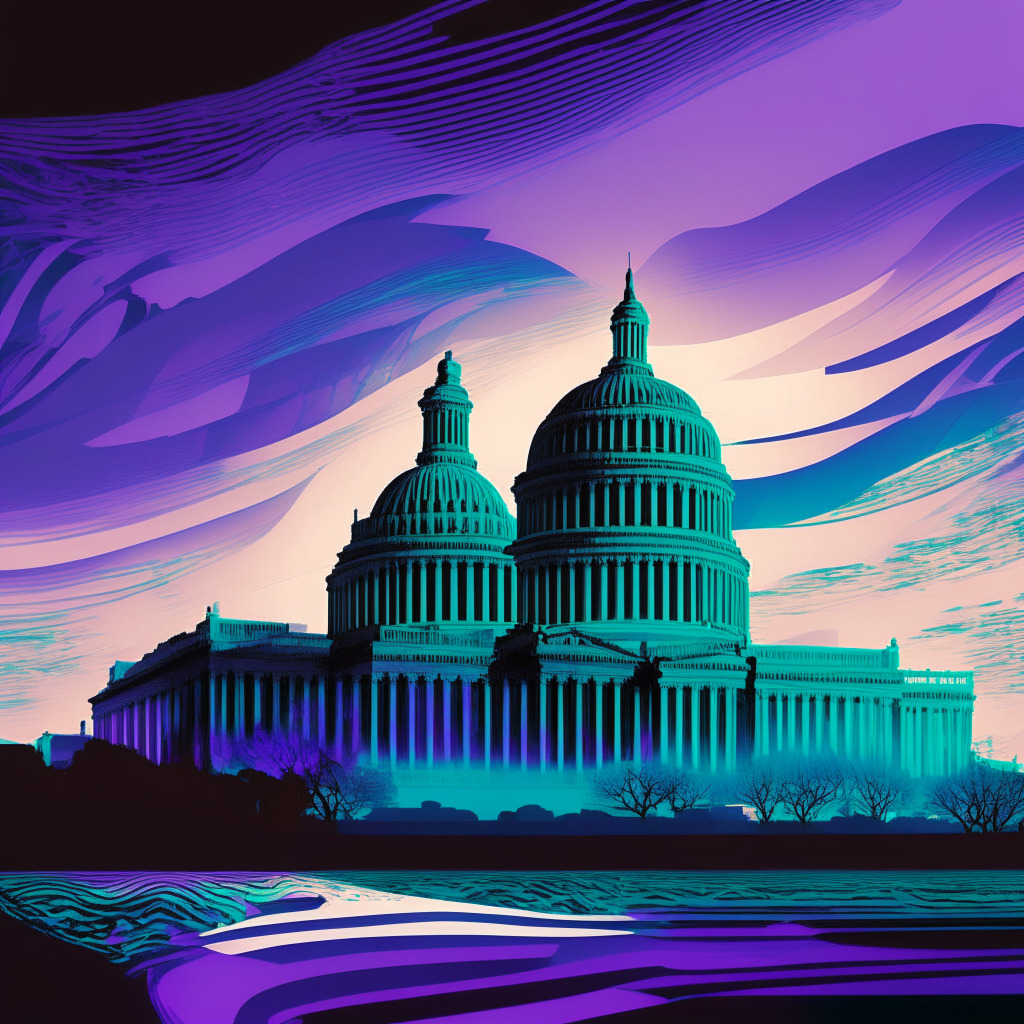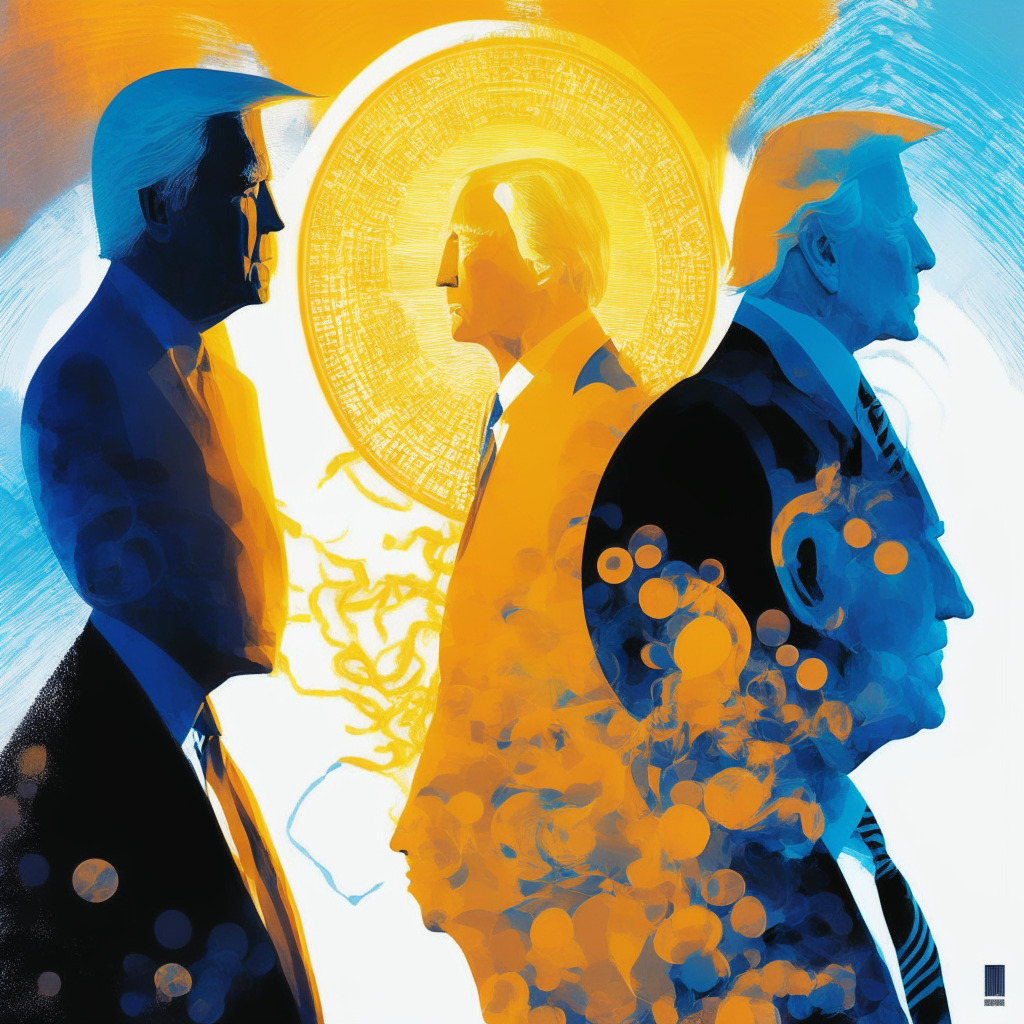The US Treasury and IRS propose new regulations making digital asset brokers accountable for reporting certain sales and exchanges. This move aims to simplify tax calculations, bring digital asset tax reporting on par with securities, and prevent tax evasion. Critics, however, see this as an attempt at excessive government control, potentially stifling the growth of decentralization and web3 adoption.
Search Results for: Biden
Unraveling the IRS Draft on Digital Asset Reporting: A Regulatory Leap or Misguided Move?
The US IRS has issued draft guidelines on reporting rules for digital asset brokers. Aimed at regulating the digital asset industry, this regulation intends to streamline tax reporting and prevent fraud, proposing to raise $28 billion in fresh tax over a decade. Critics label it as “misguided” and “an attack on the digital asset ecosystem.”
Advocacy Group Coin Center Pushes for More Refined Crypto Tax Policies
Crypto policy experts at Coin Center are advocating for a better tax policy for digital assets. They propose a nominal exemption for small crypto transactions, no tax on block rewards until sold, and simpler methods for determining cryptocurrency donation amounts. They also emphasize the need for tax policy clarity for third-party non-custodial intermediaries in digital asset transactions.
The Ripple Effect of PayPal’s PYUSD: Potentially Forcing a Shift in Stablecoin Regulation Debate
The launch of PYUSD, a stablecoin backed by PayPal with over 430 million users, may accelerate crypto adoption and prompt a shift in U.S. policy towards crypto regulation. Despite previous hesitations, the massive user base might force lawmakers to urgently develop a comprehensive regulated framework for stablecoins, heralding a new era of American crypto companies demanding inclusion in economic life.
Digital Energy Council: Sustaining Crypto Mining and Shaping Policymaking in Digital Assets
The Digital Energy Council, a group dedicated to cryptocurrency miners, has been introduced as a crucial intermediary for discussions about crypto mining sustainability, and policy advancement with Washington-based policymakers. This initiative prioritizes miners’ interests while ensuring compliance with U.S. energy laws, aiming to promote responsible energy development and national security.
Crypto Mining in the Energy Spotlight: DEC’s Mission to Reframe the Narrative
The newly launched Digital Energy Council (DEC) plans to highlight the positive role of crypto miners in the energy sector. Backed by technology’s flexibility, miners either provide energy during demand or buy excess energy, reducing waste. Despite facing regulatory scrutiny and proposed taxes, the DEC aims to dispel misconceptions around energy use and advocate for crypto miner’s interests, working towards greater recognition of digital asset mining.
Crypto Miners Unite: The Digital Energy Council Paves Way Amid Regulatory Tumult
The Digital Energy Council, an alliance of crypto miners, is seeking to influence U.S. policy for friendlier laws on sustainable energy development and grid resilience. However, their goals clash with the Biden administration’s stance, including a proposed 30% tax on mining operations for environmental concerns.
Anthropic Secures $100M Investment from SK Telecom: Assessing the Future of AI in Telecom Industry
“AI developer Anthropic secured a $100 million investment from South Korean corporation, SK Telecom, to create a multilingual large language model for the Telco AI platform. This move represents SK Telecom’s aspirations to revolutionize the telecom industry leveraging AI technology.”
Skeptical Voices: Rapper Post Malone and US CBDCs Debate Stir Crypto Community
American Rapper Post Malone expressed skepticism about the potential Central Bank Digital Currency, associating it with increased government control. The duo highlighted risks including growing state control, potential loss of citizen’s income and potential impacts on social credit scores and behavioral control. Such concerns have sparked discussions in the crypto community.
Unmasking Task Force Lima: US Defense’s AI Double-Edged Sword & Tech Race with China
“Task Force Lima, initiated by the US Department of Defense, explores artificial intelligence’s potential for US defense operations enhancement. The initiative, reflecting growing concern over the AI rivalry with China, is set to streamline operations, increase efficiency and bolster warfighting capabilities, while investigating adversarial AI misuses.”
Navigating India’s Updated Data Protection Bill: BigTech’s Freedom vs Public Trust
India’s parliament has approved an update to the Digital Personal Data Protection Bill 2023, easing data compliance for tech giants. The Bill regulates data exports, with provisions for less stringent regulations on data storage, processing, and transfer. However, it’s still a topic of debate, as it potentially prioritizes tech advancement over robust data security.
Miami Mayor Launches Presidential Bid accepting Bitcoin Donations Amid CBDC Criticisms
“Miami Mayor Francis Suarez, a champion of cryptocurrencies, announced his presidential campaign will accept Bitcoin donations. Suarez criticized the Biden administration’s cryptocurrency management and expressed disdain for the concept of central bank digital currencies, pledging to ban them if elected. Despite setbacks, he continues emphasizing the importance of crypto familiarity in government leadership.”
2024 U.S. Presidency & Crypto: Favouring Central Bank Digital Currencies or Upholding Bitcoin?
“According to Grayscale, presidential candidates Joe Biden and Donald Trump might support the development of central bank digital currency (CBDC), despite their unclear stance on Bitcoin. Other candidates have expressed both support for cryptocurrencies and opposition to CBDCs. Amidst this, regulatory uncertainty tests the resilience of crypto firms and generates various views about the future of cryptocurrencies.”
Navigating Uncharted Waters: The Question of Crypto Regulation and Tax Evasion
Senators Elizabeth Warren and Bob Casey are urging strict enforcement of crypto reporting requirements within the Infrastructure Investment and Jobs Act (IIJA), suggesting clear tax reporting guidelines for digital asset “brokers”. This measure aims to close the $50 billion “crypto tax gap”, addressing the tax evasion in the crypto industry.
Unveiling Politics of Crypto: RFK Jr. Advocates Bitcoin Despite Environmental Controversy
U.S. presidential candidate Robert F. Kennedy Jr. proposes a less alarmist view on Bitcoin’s environmental impact, saying it shouldn’t limit financial freedom. Should he win, he plans to exempt Bitcoin from capital gains tax and shows interest in backing the U.S. dollar with Bitcoin.
Prospective President DeSantis: Halting the War on Crypto and Spurning CBDCs
Presidential hopeful Ron DeSantis pledges to halt the “war on Bitcoin and cryptocurrency” if elected President, criticizing the current administration’s approach to digital assets. DeSantis equates potential US plans for a central bank digital currency (CBDC) to those in China, expressing mistrust over government control of finances and stifling economic freedom.
Crypto Market Flux: Regulatory Tremors, Political Shocks, and IRS Intrusions
The crypto market recently experienced a plunge, with Bitcoin dipping around 2%, amidst political and lawsuit shocks. The SEC has accused Richard Heart, Hex creator, of selling unregistered securities worth $1 billion, causing the HEX price to plummet. This has led to increased anxiety in the crypto community, with investors also watching out for potential regulations. Meanwhile, the IRS has issued a ruling requiring US taxpayers to add crypto staking rewards to their annual income. Despite the challenges, crypto enthusiasts see potential in the top 15 digital assets for 2023, but caution and thorough research are advised.
Campaign Promises and Crypto: How Political Stances May Shape the Future of Bitcoin
Florida Governor Ron DeSantis, during his 2024 presidential campaign, vowed to prohibit central bank digital currencies (CBDCs) and suppress any policy by the current Biden’s administration pertaining to Bitcoin and cryptocurrency regulation. The move has sparked renewed conversations about digital currencies in the political sphere.
Presidential Candidate’s Pro-Crypto Stance: Game Changer or Empty Promise?
Presidential candidate Ron DeSantis’ stance on cryptocurrencies aims to dispel the purported “war on bitcoin and cryptocurrencies” by the current administration. DeSantis’ intent is to allow American citizens the freedom to invest in cryptocurrencies, offering a potential paradigm shift in this sphere.
Blockchain’s Role in Securing the AI-Driven Future: An Essential Counteraction to AI Threats
“AI’s potential benefits come with risks, such as new attack avenues for cybercriminals. Blockchain technology could counter these security threats introduced by AI. Its immutable, decentralized storage combats unauthorized modifications or tampering with datasets that define AI models, assuring data integrity and preventing unauthorized AI utilization.”
Could Bitcoin Decide the Next President? Exploring Cryptocurrency’s Growing Political Influence
“Bitcoin and the crypto community could be deciding factors in a U.S. presidential election. Candidates now need to proclaim their stance on cryptocurrencies. The U.S. Federal Reserve estimates that 8%-11% of the American population, owning cryptocurrencies, can considerably influence the election. Anti-Bitcoin policies may thus, alienate a rapidly growing cohort of voters.”
US Elections: Kennedy’s Pro-Crypto Stance Stokes Capital Gains Tax Debate
“US Democratic presidential hopeful Robert F. Kennedy Jr. has recently committed to exempt digital currencies from capital gains tax when converted to USD. He claims this will incentivize investment, boost crypto businesses domestically and enhance citizen privacy. Critics warn that this could also open up a Pandora’s Box of risks, including financial instability and abuse of these platforms for illicit activities.”
Bipartisan Agreement on Stablecoin Regulations: A Hopeful Step or Potential Roadblock?
The Republicans and Democrats have found consensus on proposed stablecoin regulations, with the Financial Services Committee targeting state-wise legislations. The bill tasks the US Federal Reserve with enforcing regulations and could give the Commodity Futures Trading Commission more oversight over cryptocurrencies. The state vs federal regulation issue may present future challenges.
Coinbase Staking Services Halted: An Ongoing Battle with the SEC & Its Potential Impact on the Crypto Industry
Coinbase, US-based cryptocurrency exchange, has temporarily halted staking services in four US states following SEC’s lawsuit accusing them of selling unregistered securities. Amid regulatory scrutiny, Coinbase argues that their staking services aren’t securities, challenging established legal protocols and definitions of investment contracts.
Coinbase vs SEC: How a Supreme Court Ruling Could Impact Future Cryptocurrency Regulations
In facing litigation with the U.S. Securities and Exchange Commission (SEC), Coinbase draws parallels with a recent Supreme Court judgment on student debt cancellation. The cryptocurrency platform is challenging the SEC’s regulatory authority over digital assets, highlighting the lack of ‘clear congressional authorization.’ This lawsuit could significantly impact cryptocurrency regulations and the digital asset industry.
Supreme Court Ruling on Student Debt Sparks a Legal Battle in the Cryptosphere
Coinbase is facing charges from the SEC, which the crypto heavyweight claims is an attempt to extend control over the $1 trillion digital asset industry. Using a recent Supreme Court ruling, which underlined that government agencies need explicit legislative backing for major decisions, Coinbase argues the SEC doesn’t have the power it’s trying to assert.
Bitcoin ETFs – A False Dawn or a Beacon of Hope? Be Ready for the Crypto Rollercoaster
The recent dip in Bitcoin price followed a wave of ETF applications in the US which failed to shift market sentiment as anticipated. JPMorgan’s analysis suggests lack of transformative potential in the US ETF landscape. Despite this, ‘whales’ have accumulated an additional equivalent of $2.15 billion in Bitcoin, opposing the JPMorgan analysis. Understanding volatility and risk in digital assets is crucial before making financial decisions.
Notorious Twitter Hacker Sentenced: A Lesson in Blockchain Security and Crime Enforcement
Joseph O’Conner, a 24-year-old involved in the 2020 Twitter hack, has been sentenced to five years in prison and implicated in a separate SIM swapping scheme. The hack targeted high-profile accounts, soliciting Bitcoin from followers. O’Conner’s sentencing highlights authorities’ increasing efficiency in tackling cryptocurrency-related crimes and raises concerns over high-profile account safety on social media platforms.
FTX Downfall: Unraveling the $700M Influence-Buying Scandal & Future of Crypto Regulation
The FTX crypto exchange downfall reveals shocking revelations, including the misappropriation of $700 million by former leader Sam Bankman-Fried to buy influence. The unfolding saga underscores the importance of risk management, regulation, and maintaining industry integrity and credibility.
Gary Gensler, SEC, and the Crypto Conundrum: US vs EU Regulations and the Battle Ahead
SEC Chair Gary Gensler faces criticism for his broad approach to cryptocurrencies, causing venture capital investment in the U.S. crypto industry to decline compared to the European Union. The EU’s MiCA legislation acknowledges utility tokens, providing a clear framework for digital assets. New legislation is needed in the U.S. to address the definition of securities and digital asset regulation.
AI Safety Legislation: Balancing Innovation and Public Trust in the Era of Artificial Intelligence
US Senate Majority Leader Chuck Schumer plans to call for comprehensive legislation regarding AI safety measures, emphasizing bipartisan action from Congress. Addressing safe innovation, privacy, biases, and misinformation, Schumer aims to ensure responsible and secure AI development while maintaining public trust in the technology.
Darknet Task Force: Balancing Crypto Crime Fight and Blockchain Innovation
The Department of Homeland Security has formed the “Darknet Marketplace and Digital Currency Crimes Task Force,” an interagency group aimed at investigating crypto and darknet crimes and increasing collaboration. The Task Force will play a crucial role in mitigating criminal activity impact while balancing regulation and innovation in the evolving crypto industry.






























